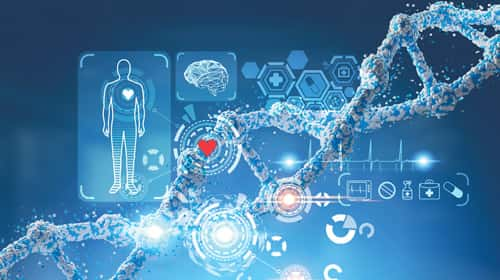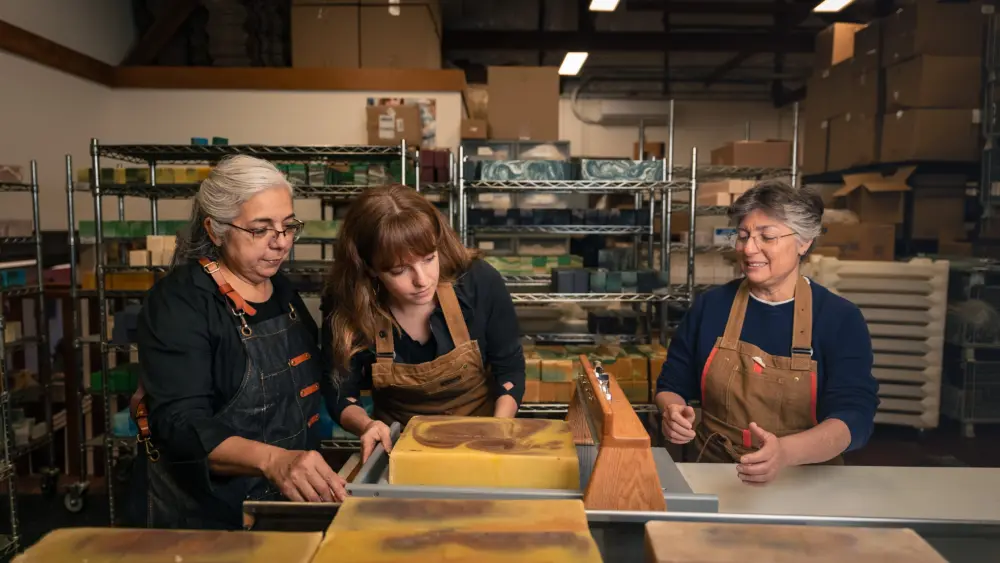
Who are you? Where are your ancestors from? We’ve all been confronted with these types of questions. And you may even have found yourself pondering, where you really come from.
Now there’s a tool available to help you discover your true self. This tool is called genetic science and it’s accessible to anyone in the form of deoxyribonucleic acid (DNA) test kits. Typically less than $200 per kit, each test contains materials to collect a sample of your DNA, usually either through saliva or a swab of cells from inside your cheek. The sample is placed inside a special envelope and mailed to the test company where it’s analyzed, and the findings are made available to you, typically within a few weeks.
 The answers that can be found within that miniscule genetic sample are mind-boggling. Not only can you discover the countries where your ancestors originated and health conditions that you could be predisposed to, but scientists might also pinpoint which wines you’ll enjoy the most, or outline the best training regimen for your seven-year-old child with a DNA-based personalized guide to soccer stardom. But wait—does this sound too good to be true, or is it too futuristic? Even within the fact-grounded analytical community of science, DNA based ‘wellness’ tests marketed directly to consumers are currently a hot topic and sometimes controversial. Some scientists go as far as to describe these tests as a modern version of snake oil, and proclaim them to be worthless or misleading to consumers. Rajina Ranadive, M.D., with St. Joseph Health Medical Group and director of the Petaluma Post-Acute Rehab doesn’t use such strong language, but can relate to the reservation. “We don’t have evidence-based treatment for much of the information we receive on gene testing, and without a treatment plan, genetic testing raises ethical questions. Can the findings create more anxiety in the patient (consumer) and is it worth it? Ultimately, the patient needs to be prepared for potentially receiving information about their health that they may not be able to prevent or treat.” So, will the purchase of a DNA test kit provide enlightenment, or will it deliver information that you would rather be without?
The answers that can be found within that miniscule genetic sample are mind-boggling. Not only can you discover the countries where your ancestors originated and health conditions that you could be predisposed to, but scientists might also pinpoint which wines you’ll enjoy the most, or outline the best training regimen for your seven-year-old child with a DNA-based personalized guide to soccer stardom. But wait—does this sound too good to be true, or is it too futuristic? Even within the fact-grounded analytical community of science, DNA based ‘wellness’ tests marketed directly to consumers are currently a hot topic and sometimes controversial. Some scientists go as far as to describe these tests as a modern version of snake oil, and proclaim them to be worthless or misleading to consumers. Rajina Ranadive, M.D., with St. Joseph Health Medical Group and director of the Petaluma Post-Acute Rehab doesn’t use such strong language, but can relate to the reservation. “We don’t have evidence-based treatment for much of the information we receive on gene testing, and without a treatment plan, genetic testing raises ethical questions. Can the findings create more anxiety in the patient (consumer) and is it worth it? Ultimately, the patient needs to be prepared for potentially receiving information about their health that they may not be able to prevent or treat.” So, will the purchase of a DNA test kit provide enlightenment, or will it deliver information that you would rather be without?
On the other hand, consumers find them useful to take a proactive approach to their health, confirm what they know about their family medical history or just for fun. Here’s an overview about DNA test kits, how they work, the information they provide and what experts have to say.
Explosive growth
The first direct-to-consumer (DTC) DNA test kits arrived on the market about a decade ago. Ancestry and 23andMe broke ground in this dynamic new field and their product offerings included the first tests considered affordable for the consumer. While Ancestry was the pioneer of the early market as it pertained to focusing on finding where consumers’ relatives came from, 23andMe’s genetic testing product was the first one available with health single nucleotide polymorphisms (SNP). Genetic sequencing and testing has been around much longer than 10 years, but up until around 2007, they had been cost prohibitive and out of reach for the average consumer. As humans, we’re a curious species by nature and we’re always in search of new and better ways to answer questions relating to the who and why of what we are. The fundamental desire for genetic testing, to learn more about ourselves, was always there. As the cost of testing went down, making them more affordable and accessible to the general public, the sale of DTC DNA test kits skyrocketed and continues to do so. From a modest start of a few thousand kits sold during the formative years, a study by Grand View Research, Inc. predicts that the global DNA test market will reach $10 billion in sales by 2022, with more than 100 million users. On the supply side, DNA test kit providers started with Ancestry and 23andMe, but today there are several hundred companies with a multitude of product offerings. In addition to the two companies that got the ball rolling, you may also have heard of MyHeritage, LivingDNA, Vitagene, GPS Origins, and FamilyTree DNA, to mention just a few of the larger companies that exist today.
Predictive vs. diagnostic
 What exactly is DNA testing, particularly as it pertains to consumers? There are several different categories of DNA testing, which fall under three main areas: screening, diagnostic and predictive. The most common uses of DNA testing are prenatal testing, cancer screening and predisposition screening, the latter which looks at variations in the genes. “Pre-natal and cancer screening tests identify changes in chromosomes and are typically accompanied with clinical oversight and expert medical counseling to ensure thorough understanding of what you’re being tested for as well as guidance around the test results and associated options available,” says Erika Gray, PharmD, chief medical officer and co-founder of ToolBox Genomics. “The results of pre-natal and cancer screening tests reveal pre-existing conditions and a level of certainty, not possibility. The third category of predictive utilizes the testing of SNPs. This is the category that Ancestry, 23andMe, LivingDNA and most of the other Direct to Consumer (DTC) DNA test kit providers fall into. SNPs—also referred to as ‘snips’—test for changes in your base pairs and not actual chromosomal abnormalities,” she continues. “The information gleaned from SNPs is predictive and not diagnostic, as with a pre-natal screening.”
What exactly is DNA testing, particularly as it pertains to consumers? There are several different categories of DNA testing, which fall under three main areas: screening, diagnostic and predictive. The most common uses of DNA testing are prenatal testing, cancer screening and predisposition screening, the latter which looks at variations in the genes. “Pre-natal and cancer screening tests identify changes in chromosomes and are typically accompanied with clinical oversight and expert medical counseling to ensure thorough understanding of what you’re being tested for as well as guidance around the test results and associated options available,” says Erika Gray, PharmD, chief medical officer and co-founder of ToolBox Genomics. “The results of pre-natal and cancer screening tests reveal pre-existing conditions and a level of certainty, not possibility. The third category of predictive utilizes the testing of SNPs. This is the category that Ancestry, 23andMe, LivingDNA and most of the other Direct to Consumer (DTC) DNA test kit providers fall into. SNPs—also referred to as ‘snips’—test for changes in your base pairs and not actual chromosomal abnormalities,” she continues. “The information gleaned from SNPs is predictive and not diagnostic, as with a pre-natal screening.”
According to Gray, the change in your base pairs can affect a wide range of traits. For instance, how well certain enzymes can help your body produce various vitamins, how well your body can transport cholesterol, or even be suggestive of certain individual characteristics such as whether you’re more likely to be a sprinter or endurance athlete, have blue eyes and curly hair. Gray further explains that SNPs are frequently referred to as “a type of wellness test that is based on SNPs” and that they can play a role in the development of various diseases such as Alzheimer’s, Parkinson’s, Coronary Artery Disease, Type II Diabetes as well as a variety of autoimmune conditions and more. One of the most common misconceptions among consumers, relative to genetic testing, is that while you may have a gene or group of genes that have been well associated with a particular chronic condition, she says, it doesn’t mean the result of the gene will ever be expressed.
The scientific community argues amongst themselves as to the extent accounted for by genetics relative to other external factors such as nutrition, exercise, stress, sleep, adherence to treatment and more. However, it’s estimated that even if you have a certain gene, there’s less than a 40 percent chance of it expressing itself. To help people have a better understanding of their gene expression, their health care practitioners can order one of many types of diagnostic tests (blood, urine, saliva) for the associated biomarkers to determine if a gene is expressed.
An important point for consumers to understand are the different levels of regulation that govern companies that conduct the actual sequencing and reporting of DNA results versus companies that simply analyze the raw DNA data. The companies that sequence the DNA are under strict FDA oversight and are limited by the FDA as to the level of information they can provide to the consumer. When you take a DNA test through a DTC company, you receive a test kit with a swab or tube. After collecting a small amount of saliva, the kit is sent back to the lab. They sequence the data and notify you when the results are available. Most companies focus on your heritage and ancestral background, but you also generally have access to all the raw data generated as part of the test, which is your data for you to do with as you please. The findings and reports provided by the company cannot indicate whether you’re at a higher risk or lower risk for certain diseases or conditions, since the FDA believes the release of such information requires practitioner oversight, such as counseling with health care practitioner or genetic counselor. However, if the consumer chooses to provide the raw data that she/he received from the testing company to another company that only does data analysis and doesn’t issue test kits itself, then the analysis company does not undergo the same FDA review and scrutiny.
To many consumers, this is the most exciting part, and this is where companies like ToolBox Genomics come into play. Toolbox takes your DNA data from your 23andMe or Ancestry test and conducts further analysis to give you a personalized, scientific, and easy-to-understand health and lifestyle plan. Based on your unique DNA, you’ll learn about different conditions and diseases that you’re predisposed to as well as what actions to take to minimize the chance of acquiring these diseases. “Your DNA test results are not gospel,” says Gray. “Just because you have a gene, doesn’t mean it’s being expressed. Many people have genes that predispose them to certain conditions, but they may never develop this condition. However, knowing your DNA test results is akin to having a road map, one that is custom made for you, based on your DNA makeup. You know what roads you will traverse, but you don’t know about the weather ahead, the obstacles you will encounter, the restaurants along the way, or the people you’ll meet. Another way to think about it is that your DNA establishes the set for your play of life, but you’re the actor, the director, the producer, the costume designer on the set. You’re the one making all the decisions of how to interact with that set.”
The consumer—who wants to be tested?
The users of DNA test kits are typically interested in learning about one of two aspects—their ancestry (either out of curiosity or with the intent of finding biological relatives or even birth parents), or they’re seeking information that may be relevant to their health and wellness.
ToolBox Genomics, headquartered in San Francisco, caters to consumers seeking knowledge about their predispositions to certain health risks or ways they can understand more about their bodies and how to live a healthier life. Toolbox teaches consumers what actions can be taken to minimize such risks and maximize genetic weaknesses around diet, lifestyle, exercise and supplementation. “Our consumers predominantly fall into two categories: Millennials and Baby Boomers,” says Gray. “Millennials have taken a specialized interest in their health and they want to be proactive about staying ahead of their health versus waiting for something to happen. Their parents are the Baby Boomers who have seen the results of a broken health care system either personally or through their own parents. Both groups want to avoid suffering from the debilitating effects of chronic disease, and they’re starting to turn to genetic tests to get answers before the condition presents itself. They’re being proactive in their health care.”
Concerns and potential risks
Data security is a concern that most of us share today in nearly everything we do, especially when data sharing happens electronically. Having your DNA tested is no exception. As there are hundreds of companies involved in DNA testing, the best advice for the consumer is to carefully review the terms and conditions section of the sales agreement. “Most companies work very diligently on protecting consumer privacy and consider this to be of highest priority,” Gray explains. “Some of the providers will ask if you want to participate in research, which in most cases means selling the data to third parties and isn’t necessarily for research purposes. However, all data should be ‘de-identified’ and not traceable back to the individual consumer. If you’re not comfortable with your data being sold for research or otherwise, look for the section in the terms and conditions where you can opt-out of all sharing. If data sharing is a concern and you can’t find the opt-out section, you may want to consider another company.” If information sharing, beyond data security, is still worrying to the consumer, it should be pointed out that genetic information cannot be used against you relative to health insurance eligibility or cost. The Genetic Information Nondiscrimination Act of 2008 (GINA) is a federal law that protects individuals from genetic discrimination in health insurance and employment. This includes family health history, the results of genetic tests and participation in genetic research.
The accuracy of DNA testing and the results is a potential concern that can be minimized or eliminated with relative ease. “It’s important that the lab doing the DNA testing follows the proper protocols set forth by the CLIA [Clinical Laboratory Improvements Amendments]. Any lab that is CLIA-capped or CLIA-certified will be proudly mentioned on their website,” says Gray. Some labs will take the additional step and obtain certification from the College of American Pathologists (CAP).
“Another aspect for consumers to consider when selecting a genetic testing company, or genetic reporting company, is what type of research is used to support the recommendations that are being provided,” Gray adds. “Some companies will cite research that’s done on animals, but the results are either extrapolated to humans, or are not highlighted as an animal study. It’s important to remember that animal research doesn’t always translate into the same effect for humans.”
One of the risks of taking a DNA test is getting undesirable news, particularly finding out that you’re predisposed to certain diseases. “Alzheimer’s and Parkinson’s are two diseases often cited by consumers as being too scary to find out about. Some companies will let you opt out of learning about these conditions in particular,” says Gray. If you want to have the raw data from your DNA test analyzed, some companies will exclude certain findings based on your instructions.
 Kathleen Mott, nurse practitioner/advanced practice nurse in genetics with St. Joseph Health Medical Group is an expert on cancer genetic risk assessment and management. Mott emphasizes that the field of genetics is not only complex, but rapidly evolving as we learn more about the 20,000-plus genes in the human genome. In her field of cancer genetics, today’s ‘multi-gene’ panel tests may contain up to 80 genes associated with an increased predisposition to developing gene-specific cancers.
Kathleen Mott, nurse practitioner/advanced practice nurse in genetics with St. Joseph Health Medical Group is an expert on cancer genetic risk assessment and management. Mott emphasizes that the field of genetics is not only complex, but rapidly evolving as we learn more about the 20,000-plus genes in the human genome. In her field of cancer genetics, today’s ‘multi-gene’ panel tests may contain up to 80 genes associated with an increased predisposition to developing gene-specific cancers.
“Consumers should understand that the DTC DNA testing may identify small genetic variants (SNPs), which may or may not be understood. She explains, “Consumers should carefully read all disclaimers made by the company offering the test they’re considering. And before submitting the sample, they should carefully consider what they hope to learn from DNA testing. “You should consider all possibilities of the potential findings and ask yourself if the outcome of the test will decrease or increase your level of anxiety,” Mott advises. And if you discover that you are predisposed to a disease, are you ready to inform your family members that they may be predisposed as well? A misconception she has observed is that consumers assume their doctor is able to interpret the report. In fact, unless the test is performed by a CLIA certified lab, genetic findings can’t be used to make medical management recommendations. (DTC companies are not CLIA certified.)
The possibilities of genetic science
Who am I? Remember that question? Taking a DNA test may not provide all the clues and insights to the inner workings of your body. However, if you take a DNA test and have your raw data analyzed, it can be impactful. “You’re now armed with information to potentially put yourself in a position to be proactive with your health care as opposed to always reacting to symptoms and being one step behind,” says Gray. “Genetic testing is here to stay and has the power to transform your health and your approach to health care.
“Just make sure you chose a company, or companies, that follow the best practices: CLIA certified labs, protected data, working with the FDA, and using human-only research,” she continues. “Your genes are not your destiny; rather, your genes are a blueprint that is unique to you. While you can’t change your genes, you can change the environment surrounding your genes—the food you eat, the air you breathe, the length of sleep you get and the way you exercise. These are all customizable pieces, based entirely on your individual genetic profile.”
Ask yourself what you’re seeking to learn with a DNA test. Research and select a provider, or providers, that fit with your objectives, and understand that, while extremely powerful, genetic science won’t guarantee your child to be a soccer star. However, you may find out that your family tree has branches into places your never would have suspected, and you can make simple changes to your lifestyle to proactively manage your health care, placing you ahead of the curve and not behind.
325 kamra
For Korean adoptees who want to find their biological families, there’s 325Kamra.
The idea of Korean Adoptees Mixed Race Association (Kamra) was born in 2015 when five women of mixed Korean heritage found themselves in a hotel room at a Koreans & Camptowns conference in Berkeley. (Yes, they were in room 325!) For some of them, their successful searches were the result of long and hard research efforts and relentless problem solving along the way. They knew their experience and insights could be leveraged in support of other people searching for their biological heritage. One of the challenges that they encountered when trying to establish a DNA link with potential family members in Korea, was the lack of availability of data in Korea and the mechanism or processes for conducting DNA comparisons. Katherine Bradtke, co-founder and board member of 325Kamra knew that forming a nonprofit organization with a global reach and mission that utilized DNA data, could help those looking for their biological families.
The organization’s mission is: To DNA-test birth searching families in Korea and collect medical and family history data from them; to distribute DNA kits to Korean Adoptees worldwide; and to help families reunite when possible. The organization provides free DNA test kits to Korean adoptees in Canada, Europe, Australia and Asia and to potential biological family members in Korea. (There is a separate vetting process for Korean adoptees in the U.S.) They also facilitate the search process by assisting and guiding the adoptee with research, understanding of DNA and its role, use of available tools, translation and other initial contact needs, and linking them to an online support group with established connections. In describing the role of DNA, Bradtke says, “Trying to find biological relatives is akin to finding a needle in a haystack. But DNA is the magnet that will find the needle. It’s a total game changer. It makes finding answers to questions that we long thought unknowable…knowable.”
crowdsourcing: why get a dna test?
 I did 23 and Me genetic testing back in the year 2011. A good friend of mine had done the testing and it amazed me how much information was provided about your DNA as it relates to health conditions. Later, a class action lawsuit was filed against 23 and Me) and much of this information is no longer available to the public (www.forbes.com). I found the information rather useful as many of my potential health threats can be controlled by proper diet and exercise. I love the ancestry information as well – it’s fun seeing all of the places on the globe where your DNA relatives lived.
I did 23 and Me genetic testing back in the year 2011. A good friend of mine had done the testing and it amazed me how much information was provided about your DNA as it relates to health conditions. Later, a class action lawsuit was filed against 23 and Me) and much of this information is no longer available to the public (www.forbes.com). I found the information rather useful as many of my potential health threats can be controlled by proper diet and exercise. I love the ancestry information as well – it’s fun seeing all of the places on the globe where your DNA relatives lived.
—Cherisa Kmetovicz, Santa Rosa
 I won’t do one. If you read their terms of service, you’ll eventually lose all control over your DNA and results. In the world of privacy and how much people just freely give up personal information, it’s not worth it to me. Yes, it’s interesting to get that stuff, but not at the cost of privacy.
I won’t do one. If you read their terms of service, you’ll eventually lose all control over your DNA and results. In the world of privacy and how much people just freely give up personal information, it’s not worth it to me. Yes, it’s interesting to get that stuff, but not at the cost of privacy.
––Jarett Skeffington, Rohnert Park
 I provided my sample after eating a meal and having a cigarette. They later sent me an email stating I needed to re-do my test, as something interfered with the quality of the sample. You have to read all of the instructions thoroughly. This was somewhat of a relief, reassuring me that it’s a thorough process—not hocus-pocus.
I provided my sample after eating a meal and having a cigarette. They later sent me an email stating I needed to re-do my test, as something interfered with the quality of the sample. You have to read all of the instructions thoroughly. This was somewhat of a relief, reassuring me that it’s a thorough process—not hocus-pocus.
––Steve Isdahl, Santa Rosa
 It’s a bit like a party favor—kind of interesting and entertaining but doesn’t narrow it down enough to be extremely informative. Pete and I did them, and being paternal twins, was like being in two different families. Our results were much different.
It’s a bit like a party favor—kind of interesting and entertaining but doesn’t narrow it down enough to be extremely informative. Pete and I did them, and being paternal twins, was like being in two different families. Our results were much different.
––Pam Rungo, Middletown




